Nginx配置文件nginx.conf详解和nginx的变量规则
Nginx配置文件nginx.conf详解
Nginx 总的 配置文件 位置 /usr/local/nginx/conf/nginx.conf
nginx 正则匹配
一.正则表达式匹配,其中:

二.文件及目录匹配,其中:

三.rewrite指令的最后一项参数为flag标记,flag标记有:
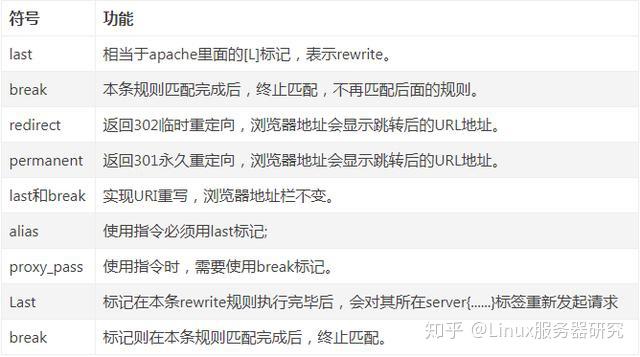
四.NginxRewrite 规则相关指令
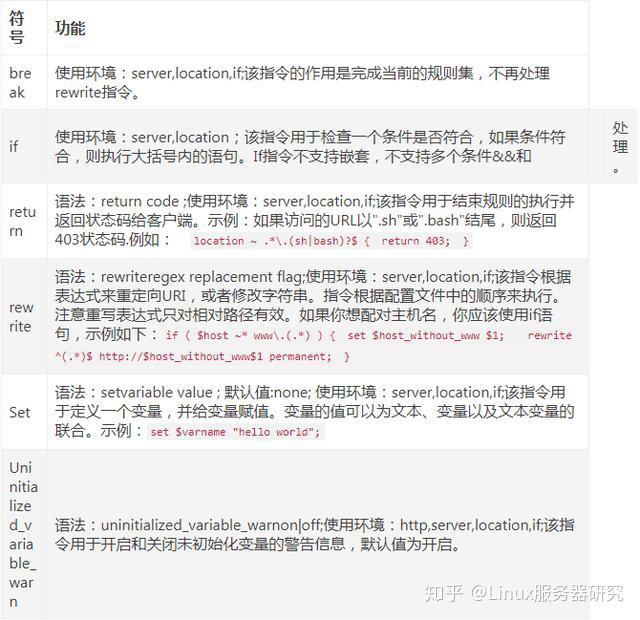
Linuxc/c++服务器开发高阶视频学习资料+qun720209036获取

五.Nginx的Rewrite规则编写实例
1.当访问的文件和目录不存在时,重定向到某个php文件
if ( !-e $request_filename )
rewrite ^/(.*)$ index.php last;
}2.目录对换 /123456/xxxx ====> /xxxx?id=123456
rewrite ^/(\d+)/(.+)/ /$2?id=$1 last;3.如果客户端使用的是IE浏览器,则重定向到/ie目录下
if( $http_user_agent ~ MSIE)
rewrite ^(.*)$ /ie/$1 break;
}4.禁止访问多个目录
location ~ ^/(cron|templates)/
deny all;
break;
}5.禁止访问以/data开头的文件
location ~ ^/data
deny all;
}6.禁止访问以.sh,.flv,.mp3为文件后缀名的文件
location ~ .*\.(sh|flv|mp3)$
return 403;
}7.设置某些类型文件的浏览器缓存时间
location ~ .*\.(gif|jpg|jpeg|png|bmp|swf)$
expires 30d;
location ~ .*\.(js|css)$
expires 1h;
}
8.给favicon.ico和robots.txt设置过期时间;
这里为favicon.ico为99天,robots.txt为7天并不记录404错误日志
location ~(favicon.ico)
log_not_found off;
expires 99d;
break;
location ~(robots.txt)
log_not_found off;
expires 7d;
break;
}9.设定某个文件的过期时间;这里为600秒,并不记录访问日志
location ^~ /html/scripts/loadhead_1.js
access_log off;
root /opt/lampp/htdocs/web;
expires 600;
break;
}
10.文件反盗链并设置过期时间
这里的return412 为自定义的http状态码,默认为403,方便找出正确的盗链的请求
“rewrite ^/ http://img.linuxidc.net/leech.gif;” 显示一张防盗链图片
“access_log off;” 不记录访问日志,减轻压力
“expires 3d” 所有文件3天的浏览器缓存
location ~*^.+\.(jpg|jpeg|gif|png|swf|rar|zip|css|js)$
valid_referers none blocked *.linuxidc.com*.linuxidc.net localhost 208.97.167.194;
if ($invalid_referer)
rewrite ^/ http://img.linuxidc.net/leech.gif;
return 412;
break;
access_log off;
root /opt/lampp/htdocs/web;
expires 3d;
break;
}11.只允许固定ip访问网站,并加上密码
root /opt/htdocs/www;
allow 208.97.167.194;
allow 222.33.1.2;
allow 231.152.49.4;
deny all;
auth_basic “C1G_ADMIN”;
auth_basic_user_file htpasswd;12将多级目录下的文件转成一个文件,增强seo效果
/job-123-456-789.html 指向/job/123/456/789.html
rewrite ^/job-([0-9]+)-([0-9]+)-([0-9]+)\.html$ /job/$1/$2/jobshow_$3.html last;13.文件和目录不存在的时候重定向:
if (!-e $request_filename)
proxy_pass http://127.0.0.1;
}
14.将根目录下某个文件夹指向2级目录
如/shanghaijob/ 指向 /area/shanghai/
如果你将last改成permanent,那么浏览器地址栏显示/location/shanghai/
rewrite ^/([0-9a-z]+)job/(.*)$ /area/$1/$2last;上面例子有个问题是访问/shanghai时将不会匹配
rewrite ^/([0-9a-z]+)job$ /area/$1/ last;
rewrite ^/([0-9a-z]+)job/(.*)$ /area/$1/$2last;
这样/shanghai 也可以访问了,但页面中的相对链接无法使用,
如./list_1.html真实地址是/area/shanghia/list_1.html会变成/list_1.html,导致无法访问。
那我加上自动跳转也是不行咯
(-d $request_filename)它有个条件是必需为真实目录,而我的rewrite不是的,所以没有效果
if (-d $request_filename)
rewrite ^/(.*)([^/])$ http://$host/$1$2/permanent;
}知道原因后就好办了,让我手动跳转吧
rewrite ^/([0-9a-z]+)job$ /$1job/permanent;
rewrite ^/([0-9a-z]+)job/(.*)$ /area/$1/$2last;15.域名跳转
server
listen 80;
server_name jump.linuxidc.com;
index index.html index.htm index.php;
root /opt/lampp/htdocs/www;
rewrite ^/ http://www.linuxidc.com/;
access_log off;
}16.多域名转向
server_name www.linuxidc.com www.linuxidc.net;
index index.html index.htm index.php;
root /opt/lampp/htdocs;
if ($host ~ "linuxidc\.net") {
rewrite ^(.*) http://www.linuxidc.com$1permanent;
}六.nginx全局变量
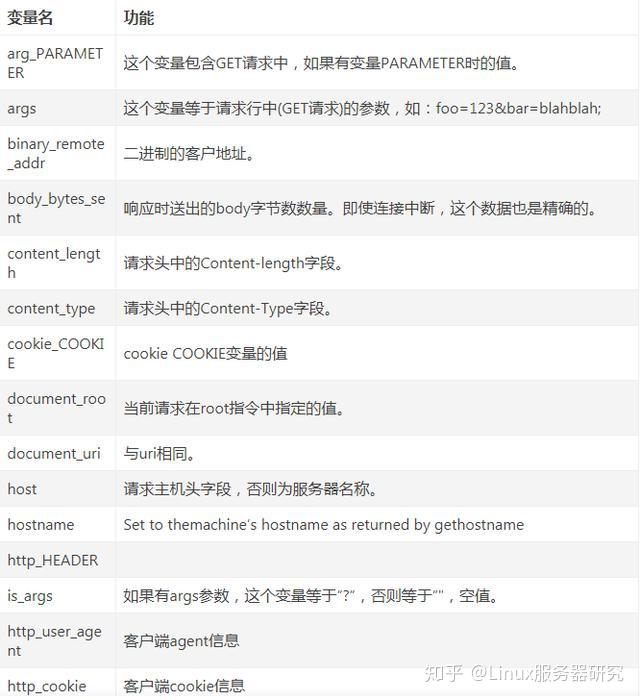
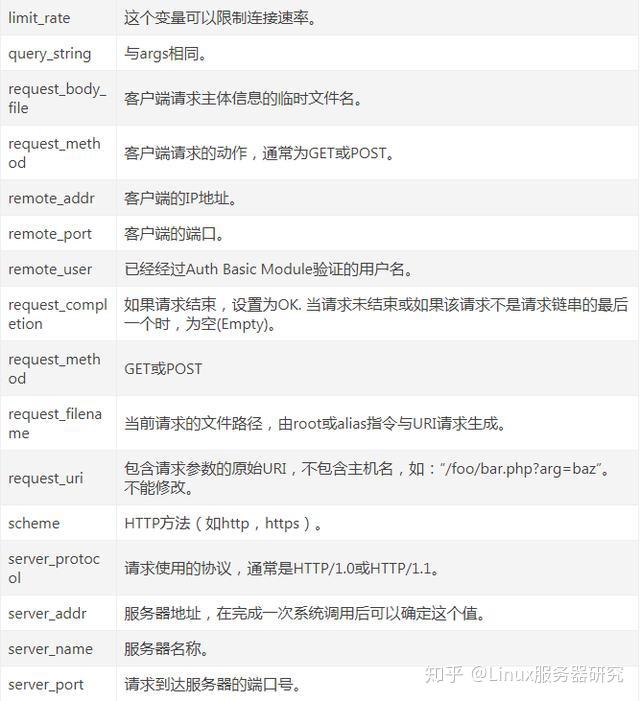
七.Apache和Nginx规则的对应关系
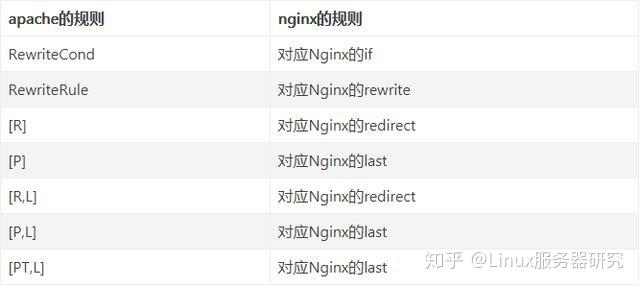
例如:允许指定的域名访问本站,其他的域名一律转向
http://www.
linuxidc.net
Apache:
RewriteCond %{HTTP_HOST} !^(.*?)\.aaa\.com$[NC]
RewriteCond %{HTTP_HOST} !^localhost$
RewriteCond %{HTTP_HOST}!^192\.168\.0\.(.*?)$
RewriteRule ^/(.*)$ http://www.linuxidc.net[R,L]Nginx:
if( $host ~* ^(.*)\.aaa\.com$ )
set $allowHost '1';
if( $host ~* ^localhost )
set $allowHost '1';
if( $host ~* ^192\.168\.1\.(.*?)$ )
set $allowHost '1';
if( $allowHost !~ '1' )
rewrite ^/(.*)$ http://www.linuxidc.netredirect ;
}nginx conf 配置文件
nginx进程数,建议设置为等于CPU总核心数.
worker_processes 8;
全局错误日志定义类型,[ debug | info | notice | warn | error | crit ]
error_log /var/log/nginx/error.log info;
进程文件
pid /var/run/nginx.pid;一个nginx进程打开的最多文件描述符数目,理论值应该是最多打开文件数(系统的值ulimit -n)与nginx进程数相除,但是nginx分配请求并不均匀,所以建议与ulimit -n的值保持一致。
worker_rlimit_nofile 65535;工作模式与连接数上限
events
#参考事件模型,use [ kqueue | rtsig | epoll | /dev/poll | select | poll ]; epoll模型是Linux 2.6以上版本内核中的高性能网络I/O模型,如果跑在FreeBSD上面,就用kqueue模型。
use epoll;
#单个进程最大连接数(最大连接数=连接数*进程数)
worker_connections 65535;
}设定http服务器
http
include mime.types; #文件扩展名与文件类型映射表
default_type application/octet-stream; #默认文件类型
#charset utf-8; #默认编码
server_names_hash_bucket_size 128; #服务器名字的hash表大小
client_header_buffer_size 32k; #上传文件大小限制
large_client_header_buffers 4 64k; #设定请求缓
client_max_body_size 8m; #设定请求缓
sendfile on; #开启高效文件传输模式,sendfile指令指定nginx是否调用sendfile函数来输出文件,对于普通应用设为 on,如果用来进行下载等应用磁盘IO重负载应用,可设置为off,以平衡磁盘与网络I/O处理速度,降低系统的负载。注意:如果图片显示不正常把这个改成off。
autoindex on; #开启目录列表访问,合适下载服务器,默认关闭。
tcp_nopush on; #防止网络阻塞
tcp_nodelay on; #防止网络阻塞
keepalive_timeout 120; #长连接超时时间,单位是秒FastCGI相关参数是为了改善网站的性能:减少资源占用,提高访问速度。下面参数看字面意思都能理解。
fastcgi_connect_timeout 300;
fastcgi_send_timeout 300;
fastcgi_read_timeout 300;
fastcgi_buffer_size 64k;
fastcgi_buffers 4 64k;
fastcgi_busy_buffers_size 128k;
fastcgi_temp_file_write_size 128k;gzip模块设置
gzip on; #开启gzip压缩输出
gzip_min_length 1k; #最小压缩文件大小
gzip_buffers 4 16k; #压缩缓冲区
gzip_http_version 1.0; #压缩版本(默认1.1,前端如果是squid2.5请使用1.0)
gzip_comp_level 2; #压缩等级
gzip_types text/plain application/x-javascript text/css application/xml;压缩类型,默认就已经包含text/html,所以下面就不用再写了,写上去也不会有问题,但是会有一个warn。
gzip_vary on;
#limit_zone crawler $binary_remote_addr 10m; #开启限制IP连接数的时候需要使用
upstream blog.ha97.com {
#upstream的负载均衡,weight是权重,可以根据机器配置定义权重。weigth参数表示权值,权值越高被分配到的几率越大。
server 192.168.80.121:80 weight=3;
server 192.168.80.122:80 weight=2;
server 192.168.80.123:80 weight=3;
}虚拟主机的配置
server
listen 80; #监听端口
server_name aa.cn www.aa.cn ; #server_name end #域名可以有多个,用空格隔开
index index.html index.htm index.php; # 设置访问主页
set $subdomain ''; # 绑定目录为二级域名 bbb.aa.com 根目录 /bbb 文件夹
if ( $host ~* "(?:(\w+\.){0,})(\b(?!www\b)\w+)\.\b(?!(com|org|gov|net|cn)\b)\w+\.[a-zA-Z]+" ) { set $subdomain "/$2"; }
root /home/wwwroot/aa.cn/web$subdomain;# 访问域名跟目录
include rewrite/dedecms.conf; #rewrite end #载入其他配置文件
location ~ .*.(php|php5)?$
fastcgi_pass 127.0.0.1:9000;
fastcgi_index index.php;
include fastcgi.conf;
}图片缓存时间设置
location ~ .*.(gif|jpg|jpeg|png|bmp|swf)$
expires 10d;
}JS和CSS缓存时间设置
location ~ .*.(js|css)?$
expires 1h;
}日志格式设定
log_format access '\$remote_addr - \$remote_user [\$time_local] "\$request" '
'\$status \$body_bytes_sent "\$http_referer" '
'"\$http_user_agent" \$http_x_forwarded_for';定义本虚拟主机的访问日志
access_log /var/log/nginx/ha97access.log access;对 "/" 启用反向代理
location / {
proxy_pass http://127.0.0.1:88;
proxy_redirect off;
proxy_set_header X-Real-IP $remote_addr;
#后端的Web服务器可以通过X-Forwarded-For获取用户真实IP
proxy_set_header X-Forwarded-For $proxy_add_x_forwarded_for;
#以下是一些反向代理的配置,可选。
proxy_set_header Host $host;
client_max_body_size 10m; #允许客户端请求的最大单文件字节数
client_body_buffer_size 128k; #缓冲区代理缓冲用户端请求的最大字节数,
proxy_connect_timeout 90; #nginx跟后端服务器连接超时时间(代理连接超时)
proxy_send_timeout 90; #后端服务器数据回传时间(代理发送超时)
proxy_read_timeout 90; #连接成功后,后端服务器响应时间(代理接收超时)
proxy_buffer_size 4k; #设置代理服务器(nginx)保存用户头信息的缓冲区大小
proxy_buffers 4 32k; #proxy_buffers缓冲区,网页平均在32k以下的设置
proxy_busy_buffers_size 64k; #高负荷下缓冲大小(proxy_buffers*2)
proxy_temp_file_write_size 64k;
#设定缓存文件夹大小,大于这个值,将从upstream服务器传
}设定查看Nginx状态的地址
location /NginxStatus {
stub_status on;
access_log on;
auth_basic "NginxStatus";
auth_basic_user_file conf/htpasswd;
#htpasswd文件的内容可以用apache提供的htpasswd工具来产生。
}本地动静分离反向代理配置
所有jsp的页面均交由tomcat或resin处理
location ~ .(jsp|jspx|do)?$ {
proxy_set_header Host $host;
proxy_set_header X-Real-IP $remote_addr;
proxy_set_header X-Forwarded-For $proxy_add_x_forwarded_for;
proxy_pass http://127.0.0.1:8080;
}所有静态文件由nginx直接读取不经过tomcat或resin
location ~ .*.(htm|html|gif|jpg|jpeg|png|bmp|swf|ioc|rar|zip|txt|flv|mid|doc|ppt|pdf|xls|mp3|wma)$
{ expires 15d; }
location ~ .*.(js|css)?$
{ expires 1h; }
}nginx 在thinkphp 的url 重写
在/usr/local/nginx/conf/vhost/你的域名配置文件 中添加
location / {
if (!-e $request_filename) {
rewrite ^/(.*)/(.*)/(.*)/*$ /index.php?m=$1&c=$2&a=$3 last; # thinkphp 的配置文件中 'URL_MODEL' => 1 PATHINFO模式
#或者 rewrite ^(.*)$ /index.php?s=$1 last; # thinkphp 的配置文件中 'URL_MODEL' =>3 兼容模式
#或者 rewrite /(.*)$ /index.php/$1 last; # thinkphp 的配置文件中 'URL_MODEL' => 2 REWRITE模式
break;
}路径 pathinfo 模式[ thinkphp ] 添加
location ~ \.php(.*)$ {
fastcgi_pass 127.0.0.1:9000;
fastcgi_index index.php;
fastcgi_split_path_info ^((?U).+\.php)(/?.+)$;
fastcgi_param SCRIPT_FILENAME $document_root$fastcgi_script_name;
fastcgi_param PATH_INFO $fastcgi_path_info;
fastcgi_param PATH_TRANSLATED $document_root$fastcgi_path_info;
